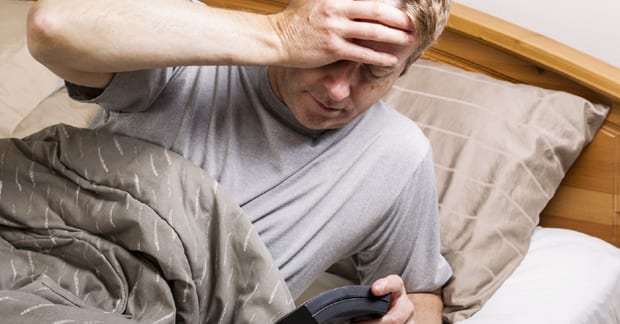Fibromyalgia (FM) and sleep dysfunction seem to go hand in hand. In fact, most people who have FM complain of problems associated with sleeping. Sleep problems can include difficulty falling asleep with or without waking up one to multiple times a night. Also, the inability to reach “deep sleep” results in waking up feeling un-restored. People with fibromyalgia frequently state, “… I feel exhausted when I wake up. I have no energy.” They often feel more tired in the morning, and many go back to sleep during the day to ease their fatigue. Another common FM complaint is having great difficulty concentrating during the day, often referred to as “…fibro fog.” Other sleep disorders such as sleep apnea and restless leg syndrome are also often associated with FM.
Restless legs syndrome (RLS) is a neurological disorder that is characterized by an overwhelming urge to move the legs at rest, thus interfering with sleep. Restless legs syndrome is more common among those who have fibromyalgia. Patients with RLS describe this as an unpleasant sensation in their legs and sometimes their arms or other parts of the body accompanied by the irresistible urge to move the legs in attempt to relieve the sensation. The terms, “itchy” or “pins and needles” or “creepy crawly” are frequently used when describing the sensations and can range from mild to intolerable. Symptoms are typically worse at rest, especially when lying or sitting and frequently result in sleep deprivation and stress. The intensity of the symptoms can vary, frequently worse in the nighttime and better in the morning. RLS may affect up to 10% of the population in the United States, especially women, and can affect both young and old, even young children. The severe cases usually affect the middle-aged or older and account for about 2-3% of the 10% incidence rate. The diagnosis is often delayed, sometimes for 10-20 years. Although the cause is not clearly described, genetics seems to play a role given about 50% of those affected have a family member with the condition.
Other conditions often associated with RLS include iron deficiency, Parkinson’s disease, kidney failure, iron deficiency, diabetes, and peripheral neuropathy. Treatment for these conditions often indirectly helps RLS resulting in sleep quality improvement. Medications such as anti-nausea drugs, antipsychotic drugs, some anti-depressants, and cold/allergy medications that contain antihistamines can worsen symptoms. Pregnancy can also trigger RLS, especially during the last trimester, and it commonly takes about 3-4 weeks for the symptoms to quiet down after delivery. Other factors that affect RLS include alcohol intake and sleep deprivation itself. Improving sleep and/or eliminating alcohol can be quite effective treatment strategies. There are no medical tests that confirm the diagnosis of RLS, but blood tests can at least rule out other conditions, and when all the tests are negative, the diagnosis is made based on a patient’s symptoms, family history, medication use, the presence of an interrupted sleep pattern with daytime fatigue, and knowledge about the condition.
Chiropractic management including the use of spinal manipulation, muscle release techniques, exercise training, and at times, physical therapy modalities has been reported to be effective in managing RLS-associated symptoms. Nutritional approaches that emphasize muscle relaxation have also been reported as helpful.




